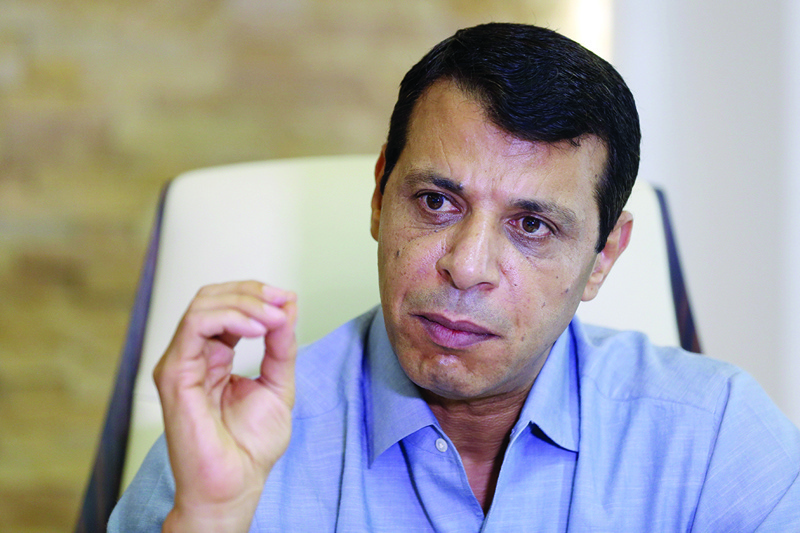
JERUSALEM: Branded "a traitor" in street protests, exiled Palestinian dissident Mohammed Dahlan is being marked out as a behind-the-scenes architect of the Israel-UAE deal that has provoked fury back home. He serves as an adviser to one of the Middle East's most powerful men, Abu Dhabi's crown prince and effective leader of the United Arab Emirates, Sheikh Mohammed bin Zayed Al-Nahyan, otherwise known as MBZ.
On August 13, US President Donald Trump made an out-of-the-blue announcement of an accord between MBZ and Israeli Prime Minister Benjamin Netanyahu to normalize ties between their countries. The next day, angry protesters in the West Bank and Gaza Strip trampled and torched portraits of Trump, Sheikh Mohammed and Netanyahu.
The picture of "traitor" Dahlan, who is no stranger to controversy, has suffered the same fate in the West Bank city of Ramallah. Now aged 58, Dahlan served as security chief in Gaza but fell out with his comrades in president Mahmud Abbas's Fatah party when it was driven out by Hamas in 2007. Four years on, he was kicked off Fatah's central committee on charges of "subversion". After security forces raided his home, it was clearly time to pack and leave. He travelled and has settled in Abu Dhabi.
The rival factions of the Palestinian leadership, Fatah and Hamas, have both condemned the agreement as a "betrayal" of their people's aspirations to an independent state. And they see Dahlan's hand behind the UAE becoming the first Arab country in a quarter century, since Jordan in 1994, to normalize ties with the Jewish state. "We're sure he was an accomplice and the sponsor of this normalization," is the firm view of Adnan al-Dumairi, spokesman of the security services in Ramallah. A source close to Hamas said they agreed.
Role in deal 'irrelevant'
On the other side of the argument, a former head of Israel's Shin Bet domestic intelligence service, Yaakov Peri, said Dahlan had not been the driving force. He has known Dahlan ever since the time they coordinated on security issues in Gaza and the two men have stayed in contact, on personal terms. "In Abu Dhabi, he has become very, very close to the ruler as economic adviser, one who knows Israel quite well," Peri said.
But "those who are blaming Dahlan for the agreement with the Emirates are not really saying something which is true," he said, although the exile had met with "many Israelis" on visits to Abu Dhabi prior to the deal. In the West Bank political capital of Ramallah, where Fatah leader Abbas is based, Dahlan is still regarded as "the enemy", allegedly as part of a failed coup against the president, said Peri.
"Abu Mazen decided he wants to get rid of him, meaning to kill him or not to let him come back to the arena, to the Palestinian arena in the West Bank and Gaza Strip," he said, using Abbas's nom-de-guerre. If Dahlan is planning to return with the ambition of succeeding 84-year-old Abbas, "the least you can say is that he's not welcome", said Peri. Over the past decade, many of Dahlan's supporters have followed his example and left the Palestinian territories. Dimitri Diliani, a senior Fatah member, said that Dahlan still has supporters on the ground, but they do not go public.
"Many politicians show support but they will never say anything in public because they don't want the president to hear or they would be out of a job," The Palestinian Center for Policy and Survey Research (PCPSR), however, has a low assessment of his popularity. Khalil Shikaki, the think tank's director, estimates Dahlan's support at around 15 percent in his native Gaza and just one percent in the West Bank. "It's unlikely that he would have any support in either place again. Whether or not he is involved in the (UAE-Israel) deal is irrelevant," he said. - AFP










